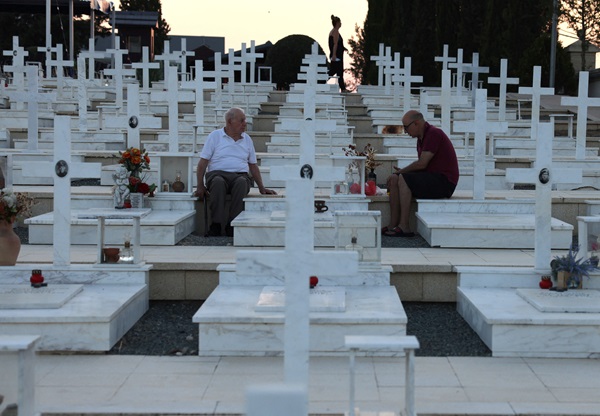 Loukas Alexandrou, 90 and his son sit above his other son's grave, who was killed in the 1974 Turkish invasion of Cyprus at the Tymvos Makedonitissas military cemetery, in Nicosia, Cyprus, 19 July 2024;
Credit: Reuters/Yiannis Kourtoglou
Loukas Alexandrou, 90 and his son sit above his other son's grave, who was killed in the 1974 Turkish invasion of Cyprus at the Tymvos Makedonitissas military cemetery, in Nicosia, Cyprus, 19 July 2024;
Credit: Reuters/Yiannis Kourtoglou
NICOSIA (Reuters) - Air raid sirens wailed across Cyprus's ethnically split capital Nicosia at dawn on Saturday 20 July 2024 as Greek Cypriots mourned, and Turkish Cypriots celebrated 50 years since Turkey invaded part of the island in response to a brief Greek-inspired coup.
Turkish President Tayyip Erdogan and Greek Prime Minister Kyriakos Mitsotakis were due to separately attend events on either side of the split island, showing their respective support for the rival sides.
The NATO allies have a series of disputes including Cyprus. Though relations have recently thawed between Turkey and Greece, Cyprus remains an emotional trigger.
Erdogan was to observe a celebratory military parade in north Nicosia marking what Turkey describes as a "peace and freedom operation".
In the south, church memorial services mourned the dead, and Mitsotakis was due to attend an event on Saturday evening marking what Greek Cypriots call a "black anniversary".
Cypriot President Nikos Christodoulides, whose role in reunification negotiations is the leader of the Greek Cypriot community, said the day was a sombre one of reflection and remembrance of the dead.
"If we really want to honour all those people who were sacrificed for us to be here today - as the Republic of Cyprus - we have to do all we can for a [peace] dialogue to restart," Christodoulides said on the evening of Friday 19 July 2024.
Cyprus gained independence from the United Kingdom in 1960, but a shared administration between Greek and Turkish Cypriots quickly fell apart in violence that saw Turkish Cypriots withdraw into enclaves and the dispatch of a UN peacekeeping force.
Turkey's 1974 invasion took more than a third of the island and expelled more than 160,000 Greek Cypriots to the south.
Reunification talks collapsed in 2017 and have been at a stalemate since. Northern Cyprus is a breakaway state recognised only by Turkey, and its Turkish Cypriot leadership wants international recognition.








